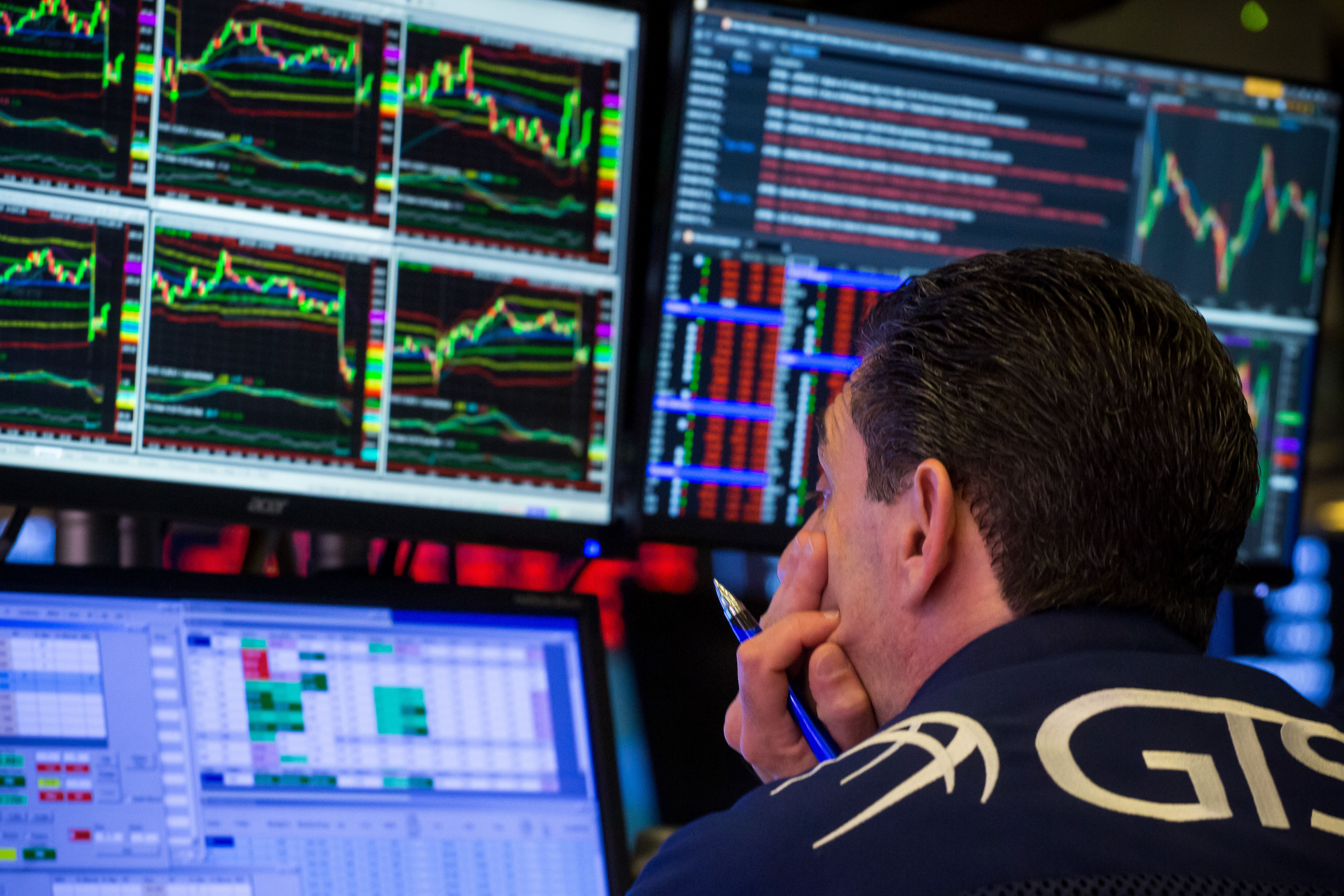
U.S. stock futures moved lower in overnight trading and pointed to declines at the open on Wednesday, following the end of the worst first quarter on record for the Dow and S&P 500 spurred by the coronavirus sell-off.
Dow Jones Industrial Average futures fell more than 1.2%, indicating a loss of about 220 points. The S&P 500 and Nasdaq were also set to open lower, with losses of 25 points and 55 points, respectively.
President Donald Trump said Tuesday evening the U.S. should prepare for a "very, very painful two weeks" from the rampant coronavirus.
"This is going to be a rough two-week period," Trump said at a White House press conference. "When you look at night the kind of death that has been caused by this invisible enemy, it's incredible."
On Tuesday, the Dow fell 410 points or 1.8% to 21,917.16, weighed down by American Express, which dropped more than 5%. The S&P 500 fell 1.6% to 2,584.59 and Nasdaq Composite dropped nearly 1% to 7,700.10. At its session high, the Dow was up more than 150 points.
The Dow secured its worst first-quarter performance ever, losing more than 23% of its value in the first three months of 2020. The 30-stock benchmark had its worst quarter since 1987. The S&P 500 fell 20% in the first quarter, its worst first quarter ever and its biggest quarterly loss since 2008. The Nasdaq fell more than 14% in the first quarter.
DoubleLine Capital CEO Jeffrey Gundlach said that the coronavirus driven market rout will worsen again in April, taking out the March low.
"The low we hit in the middle of March … I would bet that low will get taken out," Gundlach said in an investor webcast on Tuesday. "The market has really made it back to a resistance zone. ... Take out the low of march and then we'll get a more enduring low."
The coronavirus pandemic has caused a nationwide shutdown of the economy, halting business production and leaving millions of American workers unemployed. The unprecedented societal disruption has caused financial distress and volatility never seen before, ultimately causing the wort first quarter in history for both the Dow and the S&P 500.
"The quarter will be remembered as the fastest and greatest drop in the stock Market for the start of any post-war bear market," said Jim Paulsen, chief investment strategist at the Leuthold Group. "This reflects the fact that this Bear is the only one cause by a recession which was simply 'proclaimed' as leaders announced they were essential shutting down the economy. Since a recession was ensured, the Bear skipped all its normal foreplay and simply went right to the end fully reflecting a recession almost immediately."
U.S. oil experienced its worst month and quarter in history, losing more than 66% of its value in the first three months of the year. Demand has evaporated due to the coronavirus outbreak and a price war between Saudi Arabia and Russia.
Dr. Anthony Fauci, director of the National Institute of Allergy and Infectious Diseases, told CNN that he is starting to see "glimmers" that social distancing is helping to lessen the spread of the coronavirus. Meanwhile, U.S. cases of the fast-spreading virus have topped 177,000, according to Johns Hopkins University. The death roll from the virus in America has surpassed 3,400.
Wall Street also posted sharp losses for the month. The Dow and S&P 500 fell 13.7% and 12.5%, respectively, in March for their worst one-month declines since the 2008 financial crisis.
However, stocks have managed to rally towards the end of month. Investors are hoping the market has bottomed, with many strategists expecting a "V" shaped recovery, a sharp drop in GDP in the second quarter and a swift snapback in the third quarter. The so-called bond king Gundlach called those estimates "highly, highly optimistic."
On Wednesday, private payroll data is expected to show an evaporation in job creation. Moody's ADP Employment data for March will be released, with economists expecting a fall of 125,000 jobs, compared to April's addition of 183,000 non-government jobs. Markit Manufacturing PMI and ISM manufacturing index for March will also be released on Wednesday.
Subscribe to CNBC PRO for exclusive insights and analysis, and live business day programming from around the world.
https://news.google.com/__i/rss/rd/articles/CBMiTGh0dHBzOi8vd3d3LmNuYmMuY29tLzIwMjAvMDMvMzEvc3RvY2stbWFya2V0LWZ1dHVyZXMtb3Blbi10by1jbG9zZS1uZXdzLmh0bWzSAVBodHRwczovL3d3dy5jbmJjLmNvbS9hbXAvMjAyMC8wMy8zMS9zdG9jay1tYXJrZXQtZnV0dXJlcy1vcGVuLXRvLWNsb3NlLW5ld3MuaHRtbA?oc=5
2020-03-31 22:43:10Z
52780698064507
Tidak ada komentar:
Posting Komentar